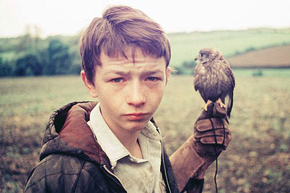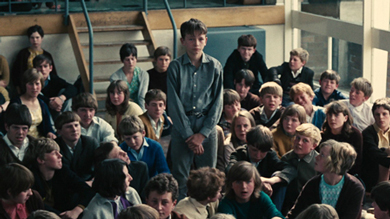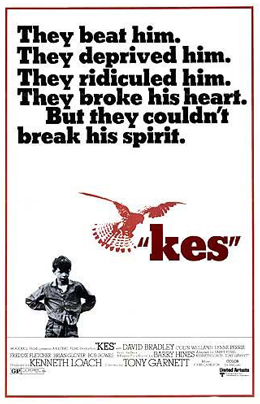
 |
|
|
|
Ken Loach's Kes has all the qualities that set Social Realist films apart from the British New Wave of a decade earlier. The "kitchen sink" classics tended to center on working class dreamers disillusioned by class barriers and tough economic times. Take away the literary pretensions and the poetry and what's left is Social Realism: gritty and often downbeat stories of real life on the social margins. 
The prolific Ken Loach (The Wind that Shakes the Barley) had been directing English TV for several years, commercial product like Z Cars as well as gritty plays about life in the working class. His first feature Poor Cow (1967) starred Carol White as an unhappy woman married to a petty criminal (Terence Stamp). Kes was adapted from the novel A Kestrel for a Knave by Barry Hines. A high school dropout, Hines worked in the mines near his South Yorkshire hometown of Barnsley at age fifteen. Quitting that job, he trained as a teacher and wrote novels in the school cafeteria after hours. Kes was filmed for just $384,000 under the auspices of Tony Richardson's Woodfall Films, the company that had previously given aid to Kevin Brownlow for his pioneering It Happened Here. The cast includes a couple of professional actors, but the all-important role of Billy went to young David Bradley, who had only acted in school plays. High schooler Billy Casper (David Bradley, a.k.a. Dai Bradley) finds life barely tolerable. He has no desire to join his older brother Jud (Freddie Fletcher) and work in the coal mines. Jud is a selfish lout who uses Billy for a punching bag when he's not picking fights with his working mother (Lynne Perrie). The trio lives in poverty and Billy delivers papers for a newsvendor before and after school. As he isn't very big, Billy is the target of bullies at school. The coach also singles him out for abuse when he hasn't money for football gear. When asked what he wants to do after graduation, Billy has no prepared response. His future seems so bleak that he barely listens to his counselors. Regularly punished by the school disciplinarian, Billy expresses his independence by pilfering from his employer and cadging his breakfast from the morning dairy truck. All that changes when Billy catches and trains a young falcon called a kestrel. He studies up on falconry and scrimps for meat scraps to feed it. Teacher Mr. Farthing (Colin Welland) stumbles upon Billy's interest in his "Kes", and discovers the spirit that lies untapped within what all assume to be a coarse and undistinguished slum boy. 
We know that Kes is a special movie when Billy doesn't behave like one of the deserving disadvantaged youngsters typically pictured in socially progressive dramas. Billy looks woefully undernourished, and his stare of sullen resignation around authority figures betrays no hidden ambition or inner poetry. Some of Billy's teachers are appalling misfits. A football coach bullies the whole team and uses Billy as a whipping boy, forcing him to take a cold shower when he isn't feeling well. The vice-principal then punishes Billy for coughing in a school assembly. Billy's hands are caned, a punishment he shares with kids caught smoking as well as an utterly innocent boy merely bringing a message from a teacher. At home Billy stays on the sidelines while his brutish brother and exhausted mother exchange sarcastic, disrespectful remarks. Billy receives little if any love but a great deal of disapproval, distrust and outright psychological abuse. The feisty little hunting kestrel is of course a symbol of the freedom and dignity denied Billy. Kes shows his great affection for the bird without distorting the story into an Animal Love tale -- Billy is not Claude Jarman Jr. in The Yearling, insisting that a frail wild animal become his personal pet. Billy Casper has his own way of getting what he needs. Turned away by the local librarian, he obtains a book on falconry by stealing one from a used bookstore. He explains to his teacher that Kes cannot be tamed, only trained. That observation pointedly applies to Billy as well. In 1970 Kes was something new and special, an alternative to "magic teacher" movies like To Sir, With Love. The United Artists representative was apparently accustomed to uncommercial art fare from Woodfall Films, and showed little enthusiasm. A sub-distributor opened it on only a few screens in Northern England. To the surprise of all it did record business -- audiences responded to the film's sense of humor, engaging characters, and the sense of authenticity in the performance of young David Bradley. Kes became a favorite of critics and a special event at film festivals. Despite the on-screen nudity and frequent swearing, censor John Trevelyan said that he "was enchanted" and passed the film with a personal note of approval. Even Variety called it "unusual and worthwhile." Kes did finally play London. The distributors found the Yorkshire dialect impenetrable and asked Loach and producer Tony Garnett if they intended to add subtitles. An alternate dialogue track overdubbed in a more standard English was prepared for international use. 
Kes consistently scores high on lists of best British films -- the British Film Institute lists it in an impressive seventh place, before The Red Shoes and The Bridge on the River Kwai. Author Barry Hines reported in the late 1990s that Barnsley is still much the same as represented as in Kes, except that the local employment situation has worsened. The region's coal mines began to close only ten years after the movie was made, during the economically oppressive Thatcher years. Criterion's attractive widescreen presentation of Blu-ray of Kes will impress viewers that have seen the film only on 16mm nontheatrical prints. Both soundtracks are present, the international re-dub and the original with the thick regional dialect. Optional English subtitles are essential on this particular title. John Cameron's music score features some pleasant themes played on the flute. Disc producer Kim Hendrickson has assembled an interesting variety of extras. Critic Graham Fuller's insert booklet essay is an excellent overview of Ken Loach and his impressive career as a filmmaker with a social conscience. A new docu gathers Loach, producer Garnett, cameraman Chris Menges and the actor David Bradley for nearly an hour of fascinating discussion. A British TV show from 1993 also profiles Ken Loach. A special extra is Loach's full 1966 TV feature Cathy Come Home, starring Carol White, from the controversial anthology series "The Wednesday Play". An original trailer for Kes finishes the impressive package. The disc is also available in a standard DVD edition.
On a scale of Excellent, Good, Fair, and Poor,
Kes Blu-ray rates:
Reviews on the Savant main site have additional credits information and are often updated and annotated with reader input and graphics. Also, don't forget the 2010 Savant Wish List. T'was Ever Thus.
Review Staff | About DVD Talk | Newsletter Subscribe | Join DVD Talk Forum |
| ||||||||||||||||||